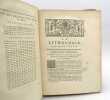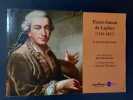-
Type
Autograph (1)
Book (2902)
Drawings (1)
Magazine (54)
Photographs (2)
-
Latest
Last 24h (28)
Last 3 days (2)
Last month (37)
Last week (2)
-
Language
English (2)
French (2956)
Italian (2)
-
Century
17th (2)
18th (36)
19th (272)
20th (1279)
21st (85)
-
Countries
Belgium (357)
Brazil (1)
Canada (7)
Côte d'Ivoire (5)
Denmark (215)
France (2054)
Italy (6)
Switzerland (315)
-
Syndicate
ALAC (7)
CLAM (1)
CLAQ (1)
ILAB (814)
NVVA (141)
SLACES (141)
SLAM (421)
Titres et Travaux du Dr Robert Deschiens.
Laval, Imprimerie Barnéoud, 1971 ; brochure in-4°, couverture de papier gris pale imprimée en noir, dos muet; 70pp.Très petite trace de mouillure dans la partie supérieure de la marge des premiers feuillets.On joint le Supplément de 1974; 4pp. Petite tache rousse à la couverture.
Le Dr Robert Deschiens ( 1895 - 1978) , fut membre de l' Institut Pasteur, il était notamment spécialiste de plusieurs maladies tropicales. ( GrF)
Darwin (Text in English)
Michael Joseph - London Malicorne sur Sarthe, 72, Pays de la Loire, France 1991 Book condition, Etat : Bon hardcover, editor's full grey clothes, no dust-jacket fort et grand In-8 1 vol. - 529 pages
1st edition Contents, Chapitres : Contents, List of Illustrations, Acknowledgments, A Devil's Chaplain ?, xxi, Text, 808 pages no dust-jacket, else fine copy, no markings
Embryology of Nemertes; with an Appendix on the Embryonic Development of Polynöe.
Boston, printed by Freeman and Bolles 1848, 230x145mm, 16pages, casing in paper boards. Book in good condition.
1 planche gravée dépl. comportant 2 gravures, Pour un paiement via PayPal, veuillez nous en faire la demande et nous vous enverrons une facture PayPal
Louis Pasteur. Le savant et bienfaiteur de l'humanité.
Couverture rigide. Cartonnage rouge. 144 pages. 15 x 24cm.
Livre. Librairie Nationale d'éducation et de récréation, Fin XIXe. Vers 1900.
Untersuchungen über die Zusammensetzung der Naturgeschichte des Plinius
Berlin, Weidmannsche Buchhandlung 1899 96pp., cart.cover (hardback), 22cm., VG
DEVAUX Henei, WOOG Paul, ABRIBAT Marcel, DOGNON André et LECOMTE du NOUY P.
Reference : 97746
"Etudes physicochimiques appliquées à la biologie; tome 1 : Sur les phénomènes de mouillabilité et les applications de ces phénomènes. Actualités scientifiques et industrielles, N° 932."
Paris, Hermann, 1942. 16 x 25, 185 pp., nombreuses figures, 3 planches, broché, bon état (quelques soulignages).
[Masson et Cie] - DEVAUX, M. H. [ DEVAUX, Henri (1862-1956) ]
Reference : 31128
(1900)
Recherches sur les Lenticelles. Etude sur les conditions physiologiques de l'accroissement et de la différenciation de la cellule et des tissus.
Extrait des Annales des Sciences Naturelles, Botanique, T. XII, 1 vol. in-8 br., Masson et Cie, Paris, 1900, 240 pp. et 6 planches hors texte
Etat satisfaisant (restauration du dos à l'adhésif) pour ce titre peu courant. L'auteur était professeur de physiologie végétale à la Faculté des sciences de Bordeaux.
Evolutionary Systems Biological and Epistemological Perspectives on Selection and Self-Organization.
Éditions Kluwer, 1998, relié, 438 pages.
État neuf.
Phone number : 04 96 21 81 64
Applications des sciences nucléaires les isotopes radioactifs en médecine
Albert de visscher-éditeur 1961 166 pages in12. 1961. broché. 166 pages.
Etat Correct (haut dos couverture frotté)
Sciences biologiques et colonisation.
Bruxelles, Maison d'édition Castaigne, Albert de Boeck, successeur, 1909. 16 x 23, 39 pp., broché, non coupé, bon état (couverture légèrement défraîchie sur les bords).
"Traité élémentaire de chimie générale et descriptive, d'après les dernières vues de la science; tome second : Chimie organique."
Bruxelles, J.-A. Rozez, Libraire, 1877. "12 x 18, 436 pp., 23 figures, reliure dos cuir, bon état (cuir abîmé et plats défraîchis; intérieur sans taches, ni rousseurs)."
Tome 2 seul.
De la zoomorphose. Ou représentation des animaux a coquilles, avec leurs explications.
Paris, chez De Bure l'aîné 1757 In-4, veau marbré, dos à nerfs, caissons ornés reliure de l’époque, 84-cvii-[1] pp. 9 planches hors-texte, bandeaux, lettrines et cuks-de-lampe. Coiffes et coins émoussés, rares rouseurs. Bon exemplaire. Seconde partie seule, complète en soi, de la seconde édition de la conchyliologie.
Bon état d’occasion
L'Histoire naturelle éclaircie dans deux de ses parties principales la lithologie et la conchyliologie dont l'une traite des pierres et l'autre des coquillages
Paris, de Bure l'Aîné, 1742. [8]-491-[1] pp., veau marbré havane, triple filet à froid en encadrement sur les plats, dos à nerfs orné de caissons dorés, pièce de titre rouge, tranches rouges (reliure un peu défraîchie mais solide, quelques taches et rousseurs).
Édition originale de cette monographie consacrée aux roches et aux coquillages. Elle comprend un lexique des mots latins ou grecs traduits en français et deux chapitres sur l'arrangement et les plus célèbres cabinets d'histoire naturelle européens. Elle est joliment illustrée d'un frontispice gravé par Chedel d'après François Boucher et de 32 planches comportant chacune plusieurs figures. Brunet, II, 23. Bon exemplaire. * Membre du SLAM et de la LILA / ILAB Member. La librairie est ouverte du lundi au vendredi de 14h à 19h. Merci de nous prévenir avant de passer,certains de nos livres étant entreposés dans une réserve.
Liste des travaux scientifiques publiés de 1898 à 1920 par Ch. Dhéré Professeur à l’Université de Fribourg.
Fribourg, Saint-Paul 1926, 230x160mm, 8pages, broché.
Pour un paiement via PayPal, veuillez nous en faire la demande et nous vous enverrons une facture PayPal
Pierre Simon de Laplace, 1749-1827. Le parcours d'un savant
Hermann 2012 In-8 broché 17 cm sur 25. 324 pages. Coin inférieur du premier plat légèrement corné, intérieur frais. Bon état d’occasion.
Bon état d’occasion
La Peur et l'angoisse : Phénomène central de la vie et de son évolution
Payot Bibliothèque Scientifique Dos carré collé 1985 In-8 (14,2 x 22,7 cm), dos carré collé, 214 pages ; couverture légèrement jaunie, quelques rousseurs sur les tranches, par ailleurs bon état général. Livraison a domicile (La Poste) ou en Mondial Relay sur simple demande.
Buffon.
P., Nouvelle Librairie Nationale, 1919, in 12 broché, 308 pages.
PHOTOS sur DEMANDE. ...................... Photos sur demande ..........................


Phone number : 04 77 32 63 69
Lysosomes in Biology and Pathology TOME 2 (1969) + TOME 3 (1973) / Frontiers of Biology
Elsevier Science Publishing Co Inc. U.S 1969 692 pages in8. 1969. Cartonné. 2 volume(s). 692 pages.
Bon état couvertures ternies intérieurs propres tampons + ex-libris
Contribution à l’étude des échanges d’ions hydrogène au cours du cycle de la contraction musculaire. Thèse d’Agrégation de l’Enseignement Supérieur.
Liège, Université de Liège 1960, 250x165mm, 169pages, broché. Bon état.
illustré, Pour un paiement via PayPal, veuillez nous en faire la demande et nous vous enverrons une facture PayPal
Evolution II - Ein Querschnitt der Forschung
Hamburg, Hoffmann und Campe 1978 266pp.with ills., cart.cover with dustwrapper, VG
The danish Ingolf-Expedition. Volume IV. 6. Free-living nematodes.
Copenhagen, Bianco Luno, 1926, in-4to, 41 p., + 15 p. de planches sur 30 feuilles + 1 carte couleur, reliure en demi-toile originale.

(SLACES, NVVA)
Phone number : 41 (0)26 3223808
La lutte pour la vie dans le monde animal , armes, venin, mimétisme, camouflage, reproduction
Payot , Bibliothèque Scientifique Malicorne sur Sarthe, 72, Pays de la Loire, France 1939 Book condition, Etat : Moyen broché grand In-8 1 vol. - 196 pages
46 photos ht. Contents, Chapitres : lutte de l'homme pour l'existence - les anthropoïdes et les singes - dents, griffes, cornes, ramures, piquants, armures - vie des castors et genres apparentés - oiseaux - en descendant l'échelle jusqu'au reptiles - serpents venimeux et leurs ennemis - lutte des amphibiens - procédés défensifs des poissons - écrans de fumée, gaz délétères, camouflage - dans le monde de la mystification - guerre disciplinée bien avant l'homme taches sur couverture, mais intérieur très frais
L'homme en évolution. Traduit par Georges et Simone Pasteur
P., Flammarion, 1966, un volume in 8, broché, couverture imprimée, (4), 432pp.
---- PREMIERE EDITION FRANCAISE ---- "Théodosius Dobzhansky travailla dans le laboratoire de génétique de T.H. MORGAN. Il réalisa la première synthèse des acquis de la génétique et de la théorie de Darwin" ---- Biologie et culture dans l'évolution de l'homme - L'hérédité - La thèse environnementaliste et son antithèse héréditariste - Egaux mais dissemblables - L'hérédité de la santé et de la maladie - La sélection naturelle et la survivance de l'apte - L'apparition de l'homme - Les facultés mentales de l'homme et leurs antécédents - Classes, castes et polymorphisme - Les races - L'évolution en action - La route parcourue et la route à parcourir**641200/V1
Le droit à l'intelligence - Génétique et égalité. Traduit de l'américain par Marc Reisinger.
"Paris, Editions Complexe, collection ""de la science"", 1978, in-8 broché, 109 pp." Cachets de bibliothèque, sinon bon état.
Un spécialiste en génétique fait le point sur la controverse des différences raciales et de leurs implications psychologiques, culturelles et sociales.
 Write to the booksellers
Write to the booksellers






![De la zoomorphose. Ou représentation des animaux a coquilles, avec leurs explications.. Dezallier d'Argenville, Antoine-Joseph]](https://static.livre-rare-book.com/pictures/AVE/129847_1_thumb.jpg)
![De la zoomorphose. Ou représentation des animaux a coquilles, avec leurs explications.. Dezallier d'Argenville, Antoine-Joseph]](https://static.livre-rare-book.com/pictures/AVE/129847_2_thumb.jpg)
![De la zoomorphose. Ou représentation des animaux a coquilles, avec leurs explications.. Dezallier d'Argenville, Antoine-Joseph]](https://static.livre-rare-book.com/pictures/AVE/129847_3_thumb.jpg)











